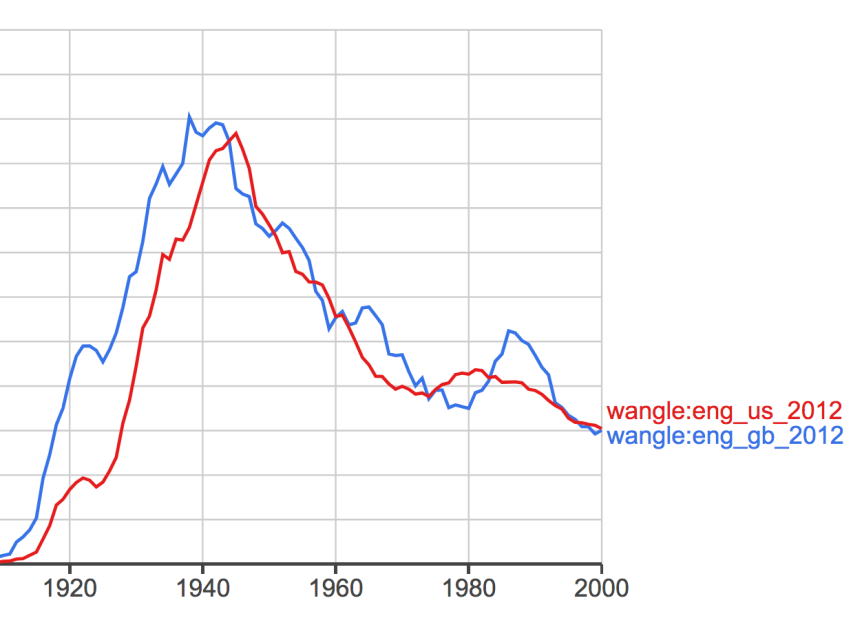To recap: a couple of posts ago, I mentioned a listicle of supposed Britishisms that included eleven words or expressions I would not have though of as such: “the bee’s knees,” “(go on a) bender,” “dim” (as opposed to clever), “full of beans,” “gallivant,” “miffed,” “round (of drinks), “smarmy,” “waffle,” “wangle,” and “shambles.” I said that three of them turned out actually to be of British origin–although even they have been common in the U.S. for at least several decades. The three are “smarmy,” “full of beans,” and today’s entry, “wangle.” (A fourth is “waffle,” which I learned is used differently in the U.S. and U.K.)
The OED‘s definition for the transitive verb “wangle” is “To accomplish (something) in an irregular way by scheming or contrivance; to bring about or obtain by indirect or insidious means (something not obtainable openly).”
The dictionary suggests an intriguing origin for the term, in an 1888 British lexicon of printers’ terms: “Wangle, a slang term used by printers to express arranging or ‘faking’ matters to one’s own satisfaction or convenience.” But the first two proper citations are from 1917: “No market is ever ‘free’: probe it deep enough, and..monopolies will..be found, in many cases deliberately ‘wangling’ prices and limiting production to sustain them.” And: “He had come in from the North Atlantic Cruiser Patrol, and when in home waters had ‘wangled’ a few days’ leave.” The first quote is from the Edinburgh Review and the second from the Stanford University Bulletin. Stanford is in California, but the reference to North Atlantic Cruiser Patrol suggests that it’s in reference to a Briton.
In any case, Google Books Ngram Viewer shows British use outpacing American till roughly the middle of World War II; ever since, it’s been roughly equivalent on both sides of the pond.

Looking into the word, I found an antedate of the 1917 OED citation. In the January 23, 1915, issue of Notes and Queries, R.W.B reported that the word “has been used recently in a newspaper, as a verb, by a writer in describing his visit to a hospital for the wounded.” He encounters a patient who “has a liking for invalid food, and says to his visitor, ‘See me wangle a jelly.’ The word, therefore, is connected with the acquirement of something by a stratagem not devoid of humor.”


‘Wangle’, as your last paragraph suggests, has quite a strong feeling of to cozen or coax something out of someone. You could say ‘I wangled a free ticket for the concert’, or ‘I wangled a discount out of them’ – meaning that you weren’t really entitled to it, but managed to appear as though you were.